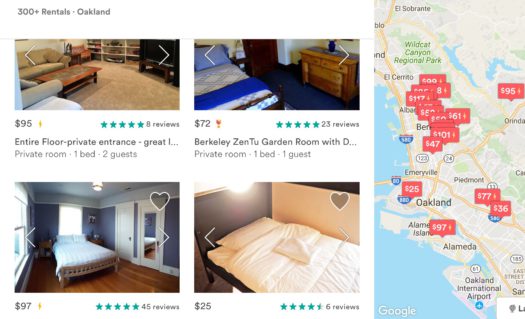Oakland housing crisis: Plenty of blame to go around
by Chris Reed | January 23, 2017 2:53 pm
 From the Mexican border to the Bay Area, local governments along the California coast fret about short-term rental operations such as Airbnb eating up already limited housing stock. In response, homeowners who use such rentals to deal with the high cost of living fire back with claims that they’re being scapegoated for local officials’ ineffective response to the Golden State’s affordable housing crisis.
From the Mexican border to the Bay Area, local governments along the California coast fret about short-term rental operations such as Airbnb eating up already limited housing stock. In response, homeowners who use such rentals to deal with the high cost of living fire back with claims that they’re being scapegoated for local officials’ ineffective response to the Golden State’s affordable housing crisis.
In Oakland, these arguments keep growing more intense as tech workers keep moving in. Uber’s plan to build a new headquarters in the city by 2018 only adds to city leaders’ concerns about housing costs.
But recent reports and surveys leave little doubt that in Oakland, both short-term renters and local officials bear responsibility for severe housing headaches.
At a recent city workshop on housing issues, officials said that only 333 of the 2,252 Oakland listings on such websites as Airbnb and VRBO — less than 15 percent — were available for long-term housing. The rest are only for short-term rentals.
With Oakland apartment vacancies running at 2 percent, it’s difficult to challenge the contention that the Airbnb effect is reducing availability and helping push long-term rental costs up.
A report by two groups which advocate for low-income residents — Community Economics Inc. and East Bay Housing Organizations — showed that Oakland Airbnb listings had soared by 50 percent in the year ending in May 2016. This trend is accelerating, according to some activists, and is a contributing factor both to Oakland emerging as one of the costliest cities for housing in the U.S. and to a surge in homelessness. Zillow reports that in the five years ending in December, Oakland had the highest percentage increase in rent of any city in the nation.
But the deaths of 36 people in a December fire at an Oakland warehouse known as the “Ghost Ship” brought national attention to the city’s and the region’s hostility to adding housing stock. A Forbes analysis[1] noted that from 2010 to 2015, while the greater San Francisco metropolitan area had added a half-million residents, only 100,000 new housing units were built, about half what was needed.
City plan would add 600 units — over 1o years
The problem is particularly acute in Oakland. From January 2013 to January 2016, the city only issued 1,332 permits to build new housing, the San Francisco Chronicle reported[2] — fewer than far smaller cities such as Sunnyvale, Brentwood and Redwood City. Forbes depicted this as being driven by the “demonizing” of both developers and newcomers. The new housing wasn’t remotely enough to accommodate the 28,000-plus residents Oakland has added[3] to the 390,000 it had in the 2010 census. In June 2014, a San Francisco Business Times article[4] noted that at a time when the Oakland housing market was hot, there was not a single significant housing project being built in the city.
Mayor Libby Schaaf’s and the City Council’s most direct response to Oakland’s housing crisis came last March, when they approved[5] new policies on fees that were intended to clear the way for construction of relatively inexpensive housing. But attempts to depict this as a major step forward were deflated by the city administrator’s office, which estimated the changes would only yield about 600 new housing units over the next decade.
- analysis: https://www.forbes.com/sites/scottbeyer/2016/12/13/oaklands-warehouse-tragedy-resulted-from-too-little-housing-construction/#72857c581a11
- reported: http://www.sfchronicle.com/business/networth/article/Bay-Area-building-boom-may-not-end-housing-7223711.php
- added: http://www.census.gov/quickfacts/table/PST045215/0653000
- article: http://www.bizjournals.com/sanfrancisco/blog/real-estate/2014/06/oakland-apartments-condos-lampwork-prices-rents.html
- approved: https://ww2.kqed.org/news/2016/04/20/oakland-city-council-approves-new-affordable-housing-impact-fee/
Source URL: https://calwatchdog.com/2017/01/23/oakland-housing-crisis-plenty-blame-go-around/